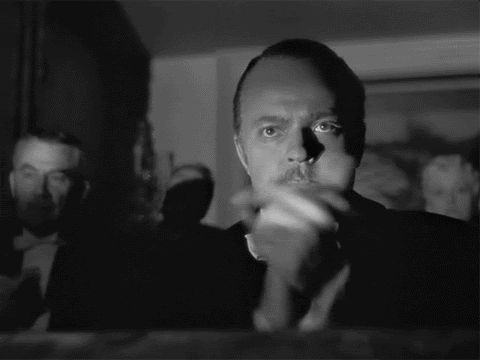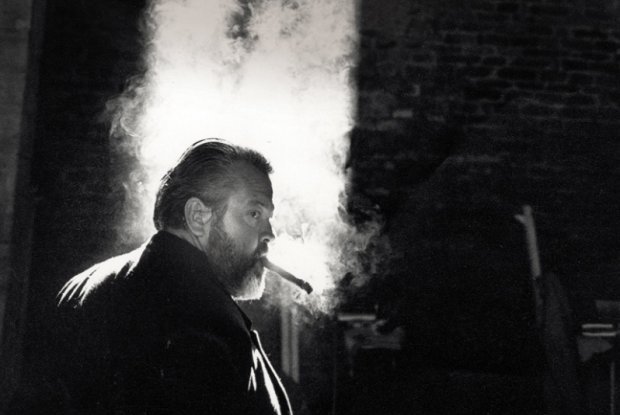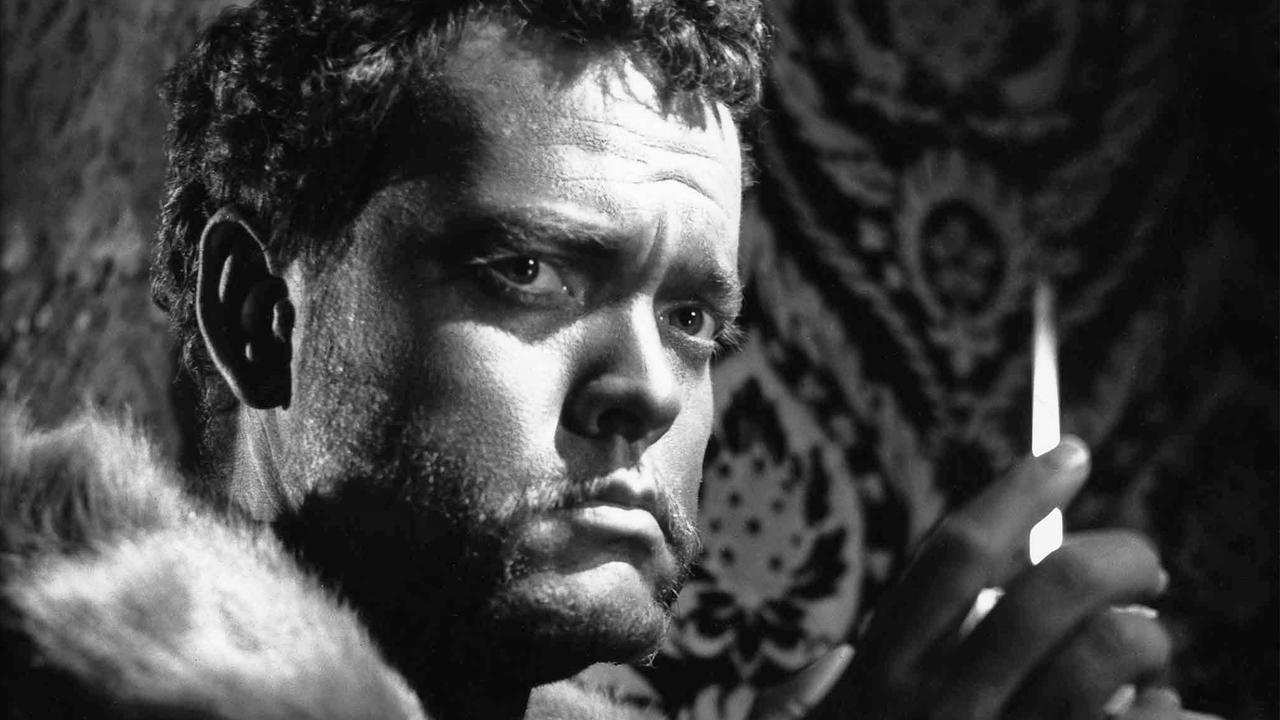Algumas coisas são fáceis de aprender. Tipo
álgebra. E gramática. E a fotossíntese. E uma segunda língua. Estas coisas
foram fáceis de aprender se você foi uma criança prodígio, como eu fui. Porque
há uma única coisa realmente difícil para um prodígio aprender: a crescer.
Orson Welles foi considerado o garoto prodígio de Hollywood, e teve problemas
após seu brilhante começo de carreira. É por isso que eu o amo tanto e o
compreendo tão bem: eu estive no lugar dele.
Some things are easy to
learn. Like algebra. And grammar. And historical facts. And the photosynthesis.
And a second language. These things were easy to learn if you were a child
prodigy, like I was. Because there is only one difficult thing for a child
prodigy to learn: how to grow up. Orson Welles was considered the boy wonder of
Hollywood, and had a hard time after his brilliant beginning. That's why I love
him so much and understand him so well: I know his pain.
Como criança prodígio, você recebe elogios e
aplausos das pessoas – dos adultos, que são os que realmente importam. Você
acha que sempre será assim. Mas então o tempo passa, e mais cedo ou mais tarde
você terá de se adequar a um padrão. O horrível, medíocre padrão dos adultos.
Os prodígios raramente seguem este padrão e acabam frustrados e sozinhos. Orson
não conseguiu se adequar ao padrão de Hollywood e em 1948 partiu para a Europa,
onde ele vagou e fez alguns ótimos, porém falhos, filmes, até sua morte em
1985.
As a child prodigy, you
receive compliments and applause from the others – the adults, the ones that
really matter. You think it'll always be like that. But then time passes, and
sooner or later you will be forced to follow a pattern. The horrible, ordinary
pattern of adulthood. Prodigies rarely follow this pattern, and end up
frustrated and alone. Orson couldn't follow the Hollywood pattern, and in 1948
left for Europe, where he wandered and made some great, yet flawed films, until
his death in 1985.
Vejamos dois momentos na carreira de Welles.
Let's see a bit of two
moments of Welles's career.
Too Much Johnson (1938) =
Keystone Kops + Eisenstein +Buñuel
Eu vi este filme por pura curiosidade. 'Too Much
Johnson” é na verdade um experimento. É – surpresa – uma comédia muda! O filme
deveria ser exibido durante a montagem de uma peça de William Gillette feita
pelo Mercury Theatre, companhia teatral de Welles. Entretanto, a Paramount
tinha os direitos para adaptar a história para o cinema e Welles teve de
desistir de seu projeto.
I watched this film out
of curiosity. “Too Much Johnson” is actually an experiment. It is – surprise,
surprise – a silent comedy! The film was meant to be shown during a stage
production of a William Gillette play by Welles's Mercury Theatre. However,
Paramount held the rights to film the story and Welles couldn't go on with his
idea.
Welles nunca editou as cenas filmadas. Por décadas
os rolos de filme foram considerados perdidos, até que foram encontrados e
restaurados em 2013. Duas versões surgiram a partir da restauração: uma com
todas as cenas, totalizando 67 minutos, e uma editada por Ciro Giorgini, com 34 minutos de duração e uma história inteligível.
Welles never edited his
shots, and abandoned the project. For decades it was considered lost until it
was restored in 2013. Two versions came out of the restoration: one with all
the takes, running 67 minutes, and one properly edited by Ciro Giorgini,
running 34 minutes and making more sense.
É difícil escrever uma sinopse para “Too Much
Johnson”. É a história de um homem (Joseph Cotten) que é perseguido pelo marido
de sua amante até Cuba. A perseguição nos lembra dos curtas dos Keystone Kops,
e como é uma obra inacabada, a versão de 67 minutos tem alguns toques de
Eisenstein – com as cenas frenéticas uma após a outra e muitos experimentos com
a câmera – e Buñuel – porque os últimos 15 minutos não fazem sentido para quem
não conhece a peça.
“Too Much Johnson” is hard to synopsize. It's about a man (Joseph Cotten)
who is chased by his misstress's husband all the way to Cuba. The chase reminds
us of the Keystone Kops silents, and since it is unfinished, the 67 minute
version has some flashes of Eisenstein – with the frantic scenes going one
after the other and lots of camera experimentation – and Buñuel – because the
last 15 minutes don't make sense for those not familiar with the play.
Depois deste pequeno problema em 1938, Orson
Welles se tornou famoso com sua leitura de A Guerra dos Mundos no rádio. Este
episódio o levou para Hollywood, mais precisamente para os estúdios RKO, onde
ele fez “Cidadão Kane” (1941).
After this little problem
in 1938, Orson Welles gained great fame with his infamous broadcasting of War
of the Worlds in the radio. This episode also took him to Hollywood, more
precisely to the RKO studios, where he made “Citizen Kane” (1941).
Othello (1952) = Laurence Olivier + Noir + Ingmar
Bergman
É a velha história de Otelo, o mouro de Veneza,
interpretado pelo próprio Welles. Otelo é levado por Iago (Micheál MacLiammóir)
a crer que sua esposa Desdêmona (Suzanne Cloutier) o está traindo. Uma tragédia acontece.
It's the old story of
Othello, the moor of Venice, who is played by Welles himself. Othello is
poisoned by Iago (Micheál MacLiammóir) and is led to believe that his wife
Desdemona (Suzanne Cloutier) is unfaithful. Tragedy follows.
Welles era megalomaníaco, mas de alguma forma
conseguiu tranformar a peça, que tem quase três horas de duração, em um filme
de 90 minutos. Mas ele fez isto durante três anos e vários projetos, sempre
ficando sem dinheiro e tendo que parar a produção e improvisar. O ator irlandês
Micheál MacLiammóir, por exemplo, foi escalado como Iago após Everett Sloane,
um excelente ator, recusar o papel.
Welles was megalomaniac,
but somehow was able to trim the original play, that runs nearly three hours,
into a 90 minute film. But he did it through three years and several projects,
always running out of money and having to stop production and improvise. Irish
actor Micheál MacLiammóir, for instance,
was cast as Iago only after Everett Sloane, a superb character actor, dropped
the offer.
Laurence Olivier foi o epítome do Shakespeare
filmado. “Otelo” nos lembra do maravilhoso “Hamlet” (1948) de Olivier,
considerando seu tom. Se considerarmos apenas o visual do filme, nos lembramos
do filme noir – com sombras ousadas e iluminação inusitada – e de Ingmar
Bergman, porque a sequência inicial de “Otelo”, que dura quase cinco minutos,
certamente influenciou “O Sétimo Selo” (1957), de Bergman.
Laurence Olivier was the
epitome of filmed Shakespeare. “Othello” reminds us of Olivier's outstanding
“Hamlet” (1948) in tone. If we consider the look of the movie, we are reminded
of film noir – with daring shadows and unusual lightning – and Ingmar Bergman,
because the opening sequence of “Othello”, that is nearly five minutes long,
certainly influenced Bergman's “The Seventh Seal” (1957).
Boa parte de “Otelo” é enfadonha. Mas o clímax é
redentor. Os 30 minutos finais são incríveis, e mostram como Welles era
habilidoso tanto como ator quanto como diretor. “Otelo” foi fruto de um duro
trabalho, filmado em Marrocos, Veneza, na Toscana e em Roma, e estreou em
Cannes com muitos elogios, inclusive ganhando a Palma de Ouro.
A good deal of “Othello”
is boring. But the climax is redeeming. The last 30 minutes are amazing, and
show how skillful Welles was as both an actor and director. “Othello” was a
hard labor of love, filmed in Morocco, Venice, Tuscany and Rome, and debuted in
Cannes to great acclaim, winning the Palme D'Or.
Welles não se adequou ao padrão de Hollywood e se
rebelou para poder continuar fazendo o que queria e aquilo em que acreditava.
Muitos de seus filmes ficaram inacabados, e seu último filme estreará ano que
vem – mais de 30 anos após sua morte. Mas Welles resistiu, como eu resisto
enquanto crítica de cinema clássico, e como todos os prodígios deveriam
resistir. Orson Welles é, acima de tudo, uma grande inspiração para os
incompreendidos.
Welles didn't fit the
Hollywood pattern and rebelled in order to keep on doing what he wanted, and
what he believed. Many of his films were left unfinished, and his last one will
debut next year – more than 30 years after his death. But Welles resisted, as I
resist as a classic film critic, as all prodigies should resist. Orson Welles
is, above all, a great source of inspiration for the misfits.
This is my heartfelt contribution to the Favorite
Director Blogathon, hosted by Laura and Quiggy at Phyllis Loves Classic Movies
and The Midnite Drive-In.







6 comments:
Welles was a great director, no doubt about it. Didn't like his acting all that much, with the exception of his role as a spokesperson for Paul Masson wines (TV commercials in the US), and his role in Touch of Evil. Interesting review. Thanks for joining the blogathon
Beautifully heartfelt with the clear ring of truth. It is the flaws and the striving in Welles work that touch me, not the perfection others may seek.
This is an excellent article. I can tell you put a lot of thought and feeling into it. I have read a lot about Orson Welles, but I have never seen any of his work. This makes me curious to look into it. Keep up the good work!
Yours Hopefully,
Tiffany Brannan
1. Algebra is not easy.
2. I want to see Too Much Johnson!!!
3. Welles has a film coming out!?!
4. Thank you for participating in this Blogathon! This is an interesting article. I've seen more of Welles' acting than directing. Still haven't seen Citizen Kane.
Excellent post and interesting perspective on a great filmmaker & complex personality. I enjoyed your look at Too Much Johnson, which I haven't seen and need to seek out!
John V
Post a Comment